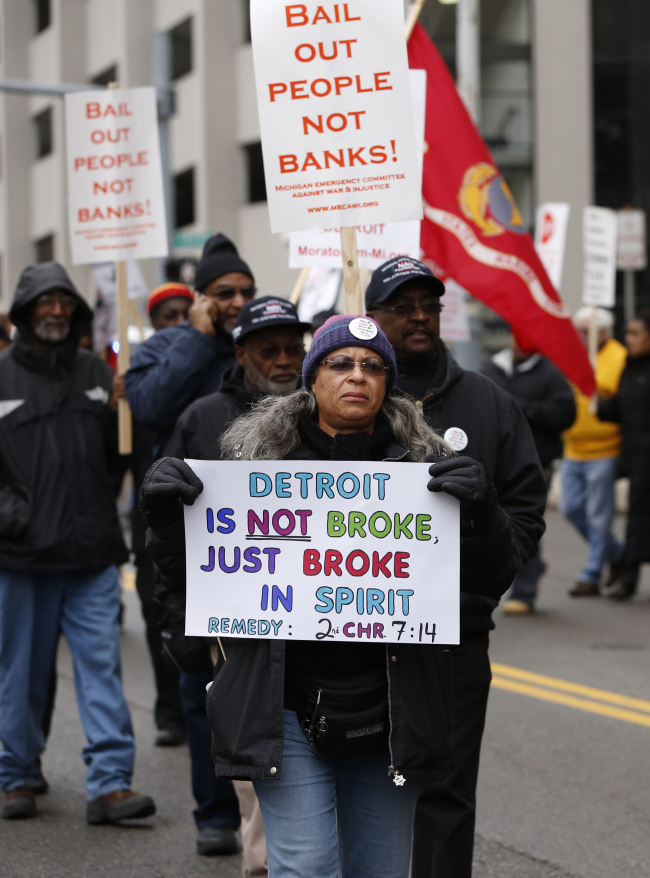 |
Protesters hold signs as they march outside the Theodore Levin U.S. Courthouse in Detroit, Michigan, Tuesday. (Bloomberg) |
DETROIT (AP) ― A federal judge ruled Tuesday that Detroit can use bankruptcy to cut employee pensions and relieve itself of other crushing debts, handing a defeat to the city’s unions and retirees and shifting the case into a delicate new phase.
Judge Steven Rhodes turned down objections from unions, pension funds and retirees, which, like other creditors, could lose under any plan to solve $18 billion in long-term liabilities.
The issue for Rhodes, who presided over a nine-day trial, was whether Detroit met specific conditions under federal law to stay in bankruptcy court and turn its finances around after years of mismanagement, chronic population loss and collapse of the middle class.
Detroit, which once offered good-paying, blue-collar jobs, peaked at 1.8 million residents in 1950 but has lost more than a million since then. Tax revenue in a city that is larger in area than Manhattan, Boston and San Francisco combined can’t reliably cover pensions, retiree health insurance and buckets of debt sold to keep the budget afloat.
The city has argued that it needs bankruptcy protection for the sake of beleaguered residents suffering from poor services such as slow to nonexistent police response, darkened streetlights and erratic garbage pickup ― a concern mentioned by the judge during the trial.
Before the July filing, nearly 40 cents of every dollar collected by Detroit was used to pay debt, a figure that could rise to 65 cents without relief through bankruptcy, according to the city.
Kevyn Orr, a bankruptcy expert, was appointed in March under a Michigan law that allows a governor to send a manager to distressed cities. A manager has extraordinary powers to reshape local finances without interference from elected officials. But by July, Orr and Michigan Gov. Rick Snyder decided bankruptcy was Detroit’s best option.
Rhodes’ decision is a critical milestone. He said pensions, like any contract, can be cut, adding that a provision in Michigan’s Constitution protecting public pensions isn’t a bulletproof shield in a bankruptcy.
The city says pension funds are short by $3.5 billion. Anxious retirees drawing less than $20,000 a year have appeared in court and put an anguished face on the case.
Rhodes signaled a desire for a measured approach and warned city officials that they must be prepared to defend any deep reductions. He promised that he would not “lightly or casually” sign off on just any cuts.
Much of the trial, which ended Nov. 8, focused on whether Orr’s team had “good-faith” negotiations with creditors before the filing, a key step for a local government to be eligible for bankruptcy. Orr said four weeks were plenty, but unions and pension funds said there never were serious across-the-table talks.
Rhodes agreed that Orr did not negotiate in good faith in the weeks ahead of the July filing. But he said the number of creditors ― more than 100,000 ― and a wide array of competing interests probably made that “impossible.”
Detroit “could have and should have filed for bankruptcy long before it did. Perhaps years,” the judge said.
Orr released a statement praising the judge’s ruling and pledging to “press ahead with the ongoing revitalization of Detroit.”
Sharon Levine, a lawyer for the city’s largest union, said she would pursue an appeal.
Behind closed doors, mediators led by another judge have been meeting with Orr’s team and creditors for weeks to explore possible settlements.
The city is so desperate for money that it may consider selling masterpieces from the Detroit Institute of Arts as well as a water department that serves much of southeastern Michigan.








